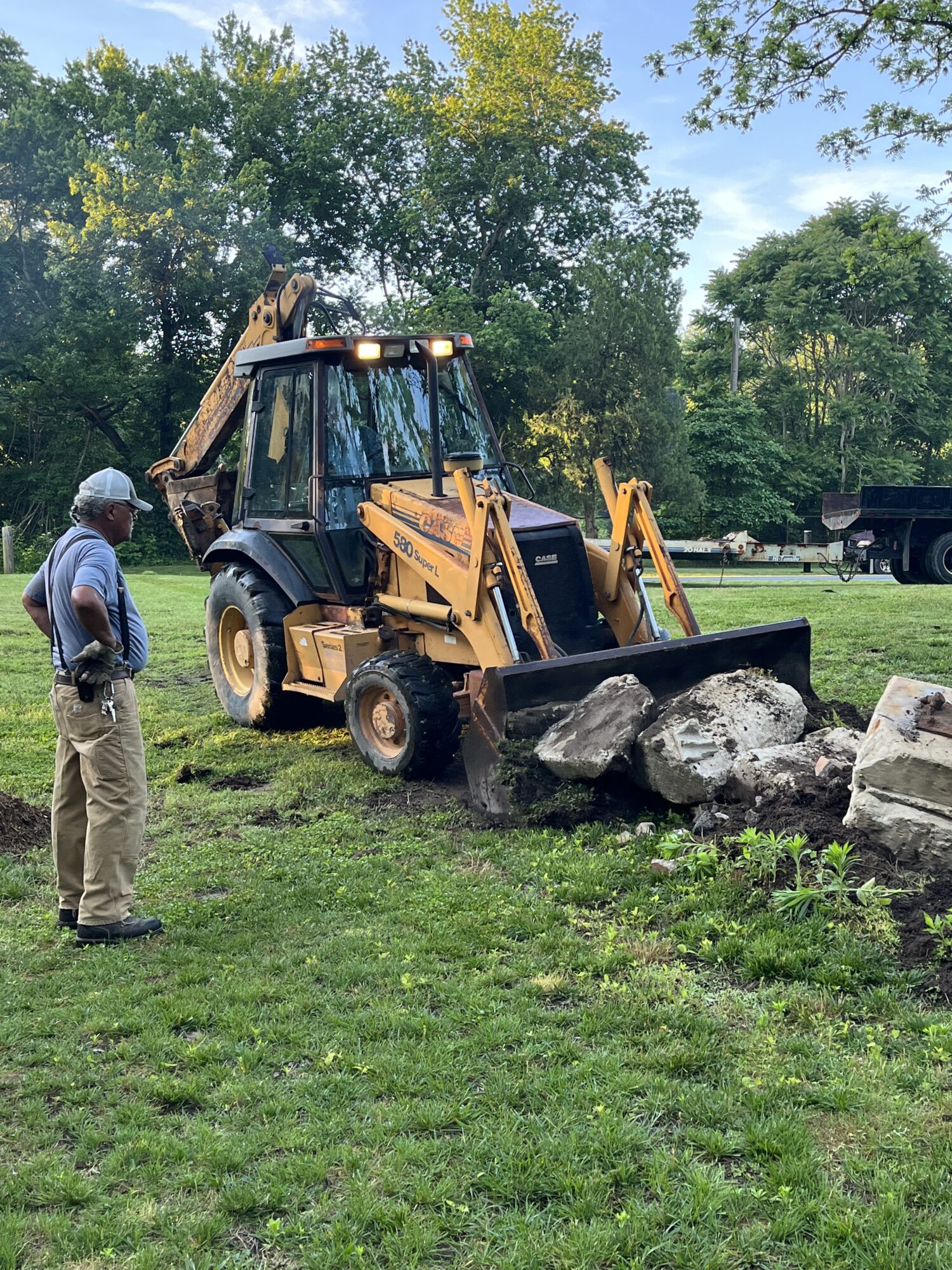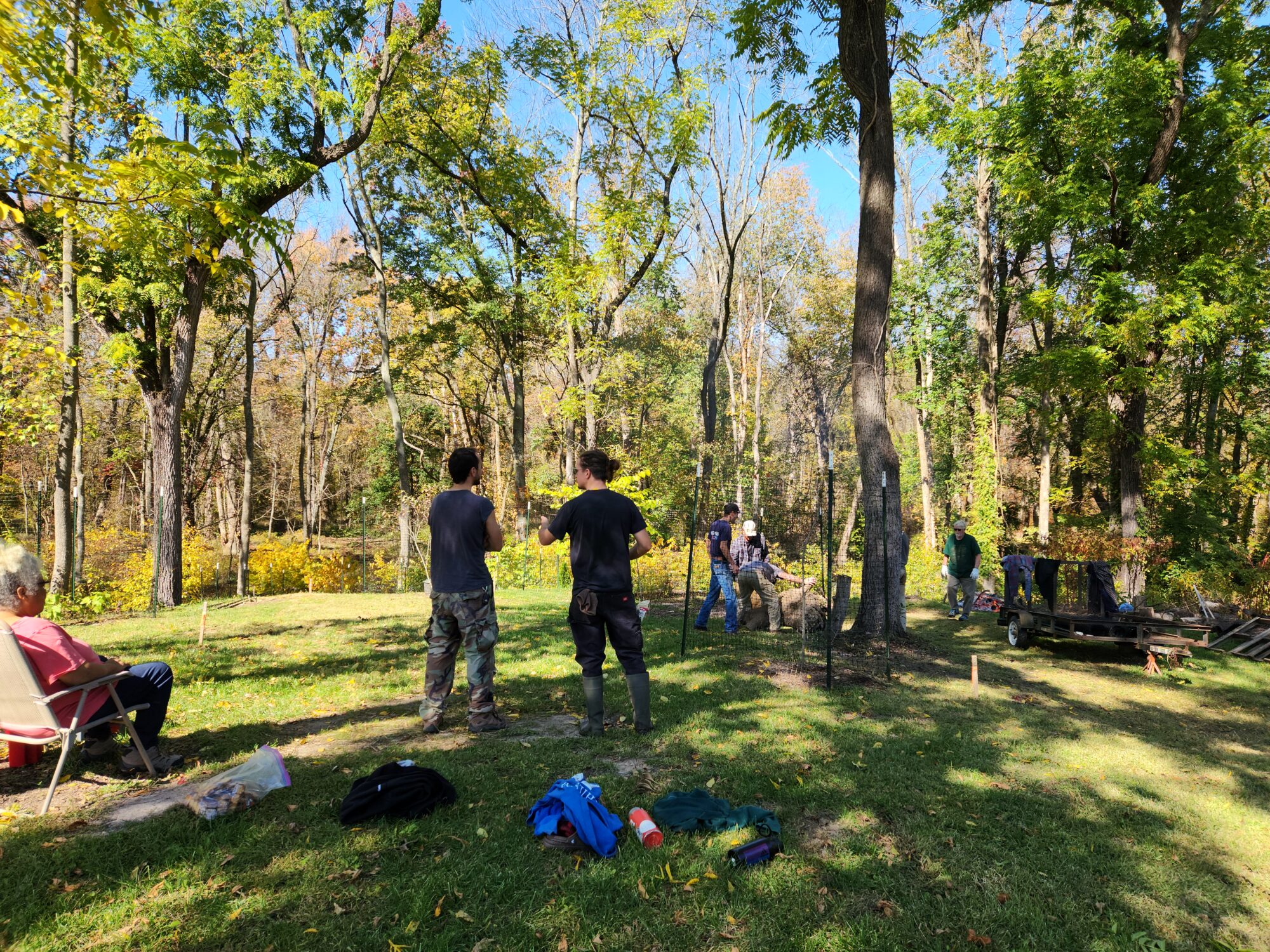All of the community orchards POP currently supports reside on the stolen, unceded lands of the Lenni Lenape. Because of this, POP seeks to engage in partnership-driven work with regional Indigenous communities centering solidarity, food sovereignty, and transparency. While POP has traditionally only worked within Philadelphia city limits, we are exploring how to expand our usual geographical boundaries for this important work.
In summer 2022, a group from Fork Branch visited the POP Learning Orchard at The Woodlands to share knowledge and inspiration for their food forest project and to discuss possible future collaboration with POP. This group included Chief Dennis Coker, Fork Branch volunteer coordinator Simon James, as well as faculty and students from the University of Delaware. POP has offered to source plant materials for the food forest project for new plantings in 2023 and beyond.
The Lenape Indian Tribe of Delaware was only officially recognized by the state of Delaware as a sovereign nation in 2016. “Right now, the Lenape Tribe of Delaware only owns one-half acre of a peninsula that we used to have had free roam of,” Coker said. “As a sovereign nation of people we really need to be able to provide for ourselves, and we can’t do that without land.”
Led by Chief Dennis Coker, the Lenape Indian Tribe of Delaware is working to decolonize their ancestral land. The tribe wants to regenerate the land to reflect Lenape culture and history accessible to both the Lenape community and the public. They are starting with the only land they now own, a piece of freshwater wooded wetlands donated to them in the late 1990’s. The land sits at the headwaters of the St. Jones river, just north of Dover, Delaware and next to Lenape ancestral burial grounds within the Village of Fork Branch.
The land and water were heavily polluted by the time they were returned to the Lenape, having been abused as a dumping ground and overtaken by invasive species. The colonization of this area began in the 1600s with Englishman Henry Hudson stealing their land and infecting the Lenape population with small pox. Of those who survived, most fled west, with the largest Lenape populations now residing in Oklahoma, Michigan, and Canada. Some Lenape, however, never left the area and maintained a Lenape community in Cheswold, just north of Fork Branch. There was a Lenape community centered specifically around this land with a Lenape burial ground, schoolhouse, and church all congregated in this area.
The state of Delaware continues to own these surrounding properties. In 1968, the land where the schoolhouse once stood was sold for $1 to the Delaware State Department to be used as a firing range. After 40 years, the state department decided to abandon the land for a new facility. The Lenape were hoping to regain access to this land, and had support from State legislators, but heavy lead contamination from bullets has held up the process. The Lenape are currently working with the Delaware Natural Resources and Environmental Control and the Environmental Protection Agency to do testing and remediation work.
But piece by piece, the group has worked to restore relationship with the land on the 1/2 acre they do have. They began by removing literal tons of trash and debris including tires, truck beds, and broken concrete. Next, they removed the Tree of Heaven (Ailanthus) which dominated the landscape leaving little space for native species.

Landscape architect students from the University of Delaware have been involved with the project and have created a proposed design. After surveying the space and the community, the students designed elements of an edible forest garden for the space. The site is not an open field, but a sloped wooded wetland with an established tree canopy. So the students proposed focusing on planting layers of understory, shrub, herbaceous, and groundcover that can thrive in partial shade.
As prescribed by the forest garden model, the students then selected plant species for each of those layers that fit within 5 different categories.
Plants That Feed Us: Paw paws, raspberries, blueberries, juneberries
Plants That Feed The Ecosystem: Mountain mint, milkweed
Culturally Significant Plants: Eastern American Black Walnut, Sumac
Medicinal Plants: Goldenrod, elderberry
Supporting Plants: Sensitive ferns, wood aster
Chief Coker dreams of a gathering space, an educational space for youth, a community center, and a food garden. You can be a part of it all by joining a work party! Every month, the group has a work party to clean up and restore the Lenape Forest Garden. To volunteer, please contact Simon James at simonpurchasejames@gmail.com or 610-348-8119.

Sources and More Info
July 2018 article on Lenape land and use
Lenape indian tribe of Delaware website
Uni of Delaware Landscape Design for Fork Branch
This blog post was prepared by POP Education Director, Corrie Spellman-Lopez.
SUPPORT US! If you found this entry useful, informative, or inspiring, please consider a donation of any size to help POP in planting and supporting community orchards in Philadelphia: phillyorchards.org/donate.